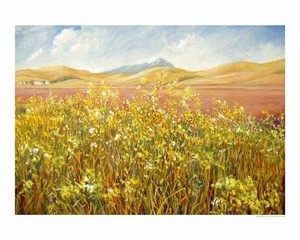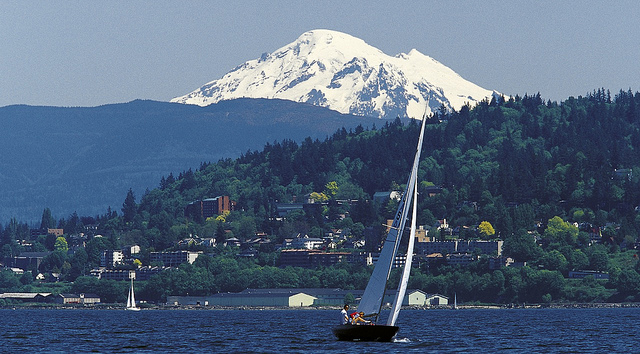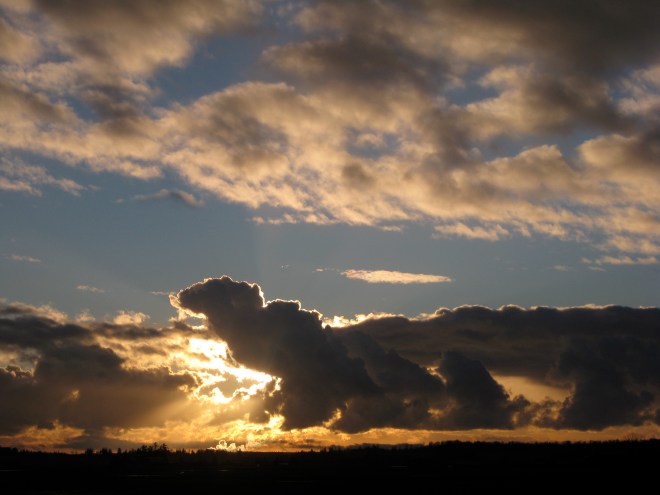Dear god. Posting what I’m about to post makes me want to vomit a bit. All around me I keep seeing women who have quit/are quitting their jobs (quitting! ha! take that, unemployment rate!) to immerse themselves in their craft. No, no. Don’t worry, N. That’s not anywhere in my near future. But…
What am I doing with my craft? Nothing? That’s right. Nothing. Drinking Apricot beer, eating chocolate ice cream and reading other peoples’ writing is not helping my story take shape. And just today, I heard the most brilliant news piece that I would love to turn into a story. But first, LK, first. Wild Mustard. I like how I italicized that, like it was published and all.
Here goes, kids. Biting the effing bullet.

Mustard by Steven Mills
Prologue
Costa Rica, 1990
For their twentieth wedding anniversary, Mom, Dad and I retraced a route they had taken ten years earlier. We traveled up Costa Rica’s Caribbean coast, from Montecillo to what is now Torteguero, encountering more howler monkeys and crocs than electricity or tourists. I fumbled around with my new fourth-grade Spanish at road-side fruit stands, with taxi drivers and in the markets.
In the first of five weeks, I lost one of my bathing suits, so the entire summer, I wore my turquoise–Dad’s eyes sparkly turquoise–suit. Mom and Dad had other suits, but I, always in the blue one, grinned like a monkey, looking straight into the camera. Only thing that changed was my tan.
One afternoon we made our way to a sleepy town called Bataan. A taxi driver took the three of us down a road dimpled with potholes. Dad’s head hit the ceiling of the little red four-door, but he didn’t seem to mind. We were dropped off at the edge of a mossy river. “What are we doing, Mom?” I asked.
“It’s an adventure,” she winked back.
A dark-skinned man waited in a boat at the water’s edge. He and my mother exchanged kisses and “Que tals.”
“Miguel, this is my daughter, Olivia,” my mom said to the local, the Tico.
“Oh, you the one who steal the red,” he said in broken English, tousling my hair and grinning at my mother’s new bottle brown. With our packs loaded in the shallow boat, we navigated the canals and plowed through debris from falling trees. Thirty minutes later, the ocean emerged before us. We took a left, headed up a channel just broad enough for our narrow skiff and puttered up the jungle arteries. Howler monkeys screamed in the canopy.
“We’re here!” Mom declared as the boat slowed to a crawl. I looked in both directions, squinting for a sign of life. Just us. The boat chugged away. “Here” consisted of a muddy bank and an overgrown path leading up a hill to the beach.
The sand sloped and waves carved embankments as far as I could see down the coast. Behind us, palm trees danced high in the air; in front, tourmaline water crashed in cacophony. The horizon hung as far away as my backpack at home in Santa Barbara.
The bangles on Mom’s arm wind-chimed as she spread out a blanket. Meanwhile, Dad, bare-chested, except for the patch of hair running up his chest, scampered around collecting firewood and pitching our tent. I loved watching my parents set themselves up in a new landscape. Though we always traveled lightly, Dad seemed to have just the tool to crack a coconut, Mom, just the elixir for a tumultuous stomach. That day on the beach was no different. Mom produced cheese, crackers and champagne. My eyes grew wide. A celebration? For what? It was moment like this, when my parents produced a home from a deserted beach and a fiesta from a backpack, that I also thought they could fly through treetops and outfox death.
Mom poured me a splash of bubbly. Then she and Dad told me their “most important story.” Over the next five years, I would hear this tale as some hear dinnertime prayer—religiously and without pause. But on this evening in Costa Rica, with the sun fading like a dye, I heard the story of my conception for the first time.
According to Mom, she and Dad watched the last colors of the day wane from the sky on this very beach ten years earlier. He was on assignment for the London-Herald, where he had secured the post as the travel editor; she had sold a commissioned story to Outside magazine. At thirty-two and four, they gallivanted around the world, uncovering stones and stories, exploring lives and legacies. They had no mortgage, no health insurance, just brimming passports, three-page writing resumes and a ten-year-old Volvo without a bumper. That afternoon, Mom had felt something tickle her thigh. She scratched and returned her gaze to the horizon. Again, more tickling. She examined the sand to her left. A black nubby object fought its’ way out of the sand. She called to Dad. Flippers emerged. More pointed heads. Turtles surfaced.
Dad impersonated Mom’s shriek. “I wasn’t scared,” she tried to convince us. In a matter of minutes, my parents had watched twenty-four baby turtles clamor from the depths of the sand and head toward the white caps of the ocean.
Mom continued the show. “Was that real, John?” she re-inacted, for my sake. She paused dramatically and then walked into the Caribbean waters, just as she had that night, sat cross-legged in the salty water and let the waves play around her.
“So dramatic,” Dad winked at me, then trotted off to Mom.
I giggled so hard that I slumped back into the sand, spilling a bit of my taboo champagne. My parents were such thespians.
Mom stood up and returned to Dad, her clothes wet with the lap of the sea and continued the decade-old scene: “What will we send out into the ocean?”
“Maybe the sand you have on your butt.”
“No. What are we going to leave behind?” They re-told these lines with the same drama each time—she clutching his arms, he staring confusedly into her face, thinking it was a joke. “We need turtles,” Mom pleaded.
“Land or sea turtles? In a cage or a pond?”
She slapped his chest. “Seriously. Our writing will always be…ugh…but this—” she pointed to the turtle track with her toe, “this is real.” She turned and winked at me, a this is important wink, which was different than Dad’s earlier Your mom’s nuts, but don’t you worry, kid, we’ll make it wink. I could read their whole squint-based language, even when I wasn’t supposed to.
My father looked at my mother. I can imagine his blue eyes searching my mother’s soul, one of those tangible gazes—the kind of look that speaks, that says, I get you. I’m listening to you. My father had a way of loving quietly, without words: the dance of fingertips on an arm, the clasp of an oven-warm hand, a series of fluttering lashes that spoke despite an unmoving mouth.
And then they made love.
So they said. I squirmed in the sand. At ten years old, talk about baby making was, as I told my mother, gross. She threw her head back and let loose her roar of a laugh. Then she came to cradle me in her long pale arms, which I have always thought were rays of the sun.
Upon finding out she was pregnant, my mother audibly thanked a God she had not believed in for decades. “Those turtles…something about them,” she’d told all of her disbelieving family and friends, and me, whenever she told the story. “All that creating and protecting and nurturing garbage–it’s true.” So I settled inside her womb for nine months; my seed, planted deep in that Costa Rican sand, brushed over by a steady stream of salty waves.





















